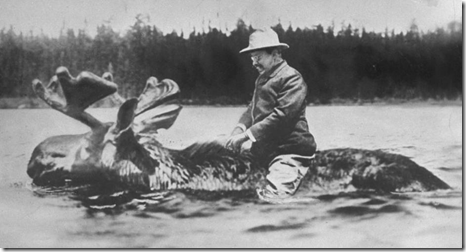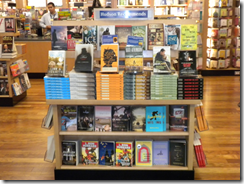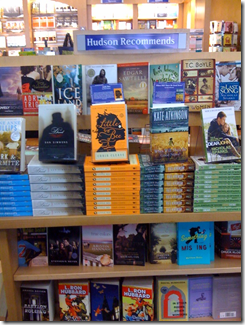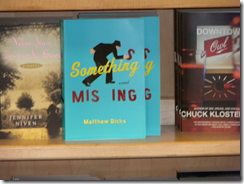When I was twenty years old, my best friend, Bengi, suggested that I begin listening to audio books during my one hour drive from Attleboro, MA to my job on Cape Cod. Feeling that I was a serious reader and future scholar, I considered audio books a tool of the illiterate masses and rejected them with all of the snobbery that an uneducated, twenty year old McDonald’s manager could muster.
I often think of this as one of the most foolish positions that I have ever assumed in my life.
Three years later, I found myself working for a marketing firm that kept me on the road all day long, Tired of commercial radio, I finally decided to give audio books a chance, jamming a cassette tape into my Sony Walkman and hitting play.
I have never turned back.
Though I still read vociferously, audio books have become the primary way that I consume books. I read about twenty books a year but listen to at least twice that many. Driving, doing chores, exercising, eating breakfast, walking the dog, and almost any other time that I am alone, I am listening to an audio book or a podcast. My headphones are a permanent fixture upon my head, even when I am not listening. In fact, I sometimes worry that my one-year-old daughter thinks that my headphones are akin to ears or a nose, just another part of Daddy’s anatomy.
They are on my head that much.
Thankfully, I am a remarkably strong auditory learner, meaning I can focus on and remember what I hear with ease, allowing me to do many other things while listening. Other's, including my wife, are not as fortunate.
Conversely, I have no visual skills with which to speak. I cannot remember a person’s face even if I just saw the person an hour ago and I have no idea what color pants I am wearing unless I look down and check. So my auditory prowess is not all roses.
Nevertheless, this makes listening to an audio book a breeze for me. In fact, I am often able to listen to an audio book or a podcast while simultaneously watching a television program, monitoring the two audio streams without difficulty, a feat that makes my wife a little crazy.
Don’t tell anyone, but I am often carrying on a conversation and listening to a podcast at the same time as well.
But although I adore the audio book and sing its praises to everyone I meet, I also have my share of complaints, and they tend to center around purchasing of audio books on disc rather than downloading the digital files.
As a member of Audible.com, I download almost all of my books from the website directly to my iTunes client and my iPhone, and the process is seamless and efficient.
This is not the case when downloading a book from a disc.
Recently, I purchased Malcolm Gladwell’s WHAT THE DOG SAW on disc from Barnes and Noble, using one of the many gift cards that I receive as a teacher. The problems with downloading and listening to this book on my iPhone (or any other MP3 player) are numerous.
First, the tracks on discs like this are often inconsistently titled, which creates problems when attempting to load a book onto a device in the correct order.
For example, the first disc might be labeled as Disc 1: #1, Disc 1: #2, etc.
Then the second disc might be labeled as Disc #2: #1, Disc #2, #2.
See the difference? The use of the extra pound sign on disc 2 can cause the tracks to misalign when they are imported into my iPhone, resulting in a skewed track order and the need for me to manually rearrange them.
It’s also highly likely (almost a certainty) that disc 10 will be listed before disc 2 on the iPhone, since disc 10 leads with the numeral 1 and disc two is never listed as 02. Therefore, 10 will come before before 2, as will every other disc labeled in the teens.
Frustrating? Hell yes.
These are simple, easily corrected errors made at the time of recording, but they are still made on a remarkably consistent basis.
Also, audio discs are usually recorded in tracks 3-7 minutes long, with no attention paid to chapter endings. This means that when I stop listening to an audio book that originated on a disc, I must note the track number where I have left off for when I return, or I will not be able to pick up the story in the correct spot. There is simply a list of one hundred or more tracks, and in the mind of the MP3 player, they are no different than songs. Exit the playlist and you start the list over.
Contrast this to GAME CHANGE, the audio book that I am currently listening to. This book was downloaded from Audible, so there were only two tracks that I needed to place on my iPhone (WHAT THE DOG SAW was comprised of 114 tracks) and the chapters are divided into easily-defined sections on each file. I know what chapter I am listening to and how much time is left on the chapter. More importantly, every time I start and stop the audio book, I am brought back to the correct spot.
No notation required.
I have only one complaint with audio books that I download digitally from Audible, and it’s a small one. Recently, I finished listening to Jasper Fforde’s LOST IN A GOOD BOOK. Like GAME CHANGE, it was comprised of two tracks. When the first track ended, the narrator made this announcement:
This audio books has been broken down into multiple parts to make the download faster. You have reached the end of a part but not the end of the complete audio book.
This announcement is made on most of Audible’s downloads, and I find it more infuriating each time I hear it. I know that the damn book hasn’t ended yet. I’ve been listening to the story for five hours. Do the producers really think that anyone might be fooled into believing that the book has ended halfway through? Have you ever read a book and thought that the halfway point might make a good ending?
Ridiculous.
But again, a small complaint.
As I said, there is no bigger fan of audio books than me.





